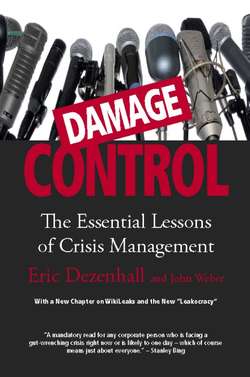Читать книгу Damage Control (Revised & Updated) - Eric Dezenhall - Страница 9
На сайте Литреса книга снята с продажи.
WHO SURVIVES?
ОглавлениеDamage Control examines these survival factors in greater detail later; however, our encounter with Socrates strongly suggested that this company didn’t have what it takes to weather the hurricane it was facing. Companies (and individuals) that survive crises tend to have certain features in common, features that are often evident in the first moments of an engagement:
• They have strong leaders who have broad authority to make decisions.
• They question conventional PR wisdom and do not worship at the altar of feel-good gurus who espouse “reputation management,” the canard that corporate redemption follows popularity.
• They are flexible, changing course when the operating climate shifts (which it usually does).
• They commit significant resources to the resolution of a crisis with absolutely no guarantee that these resources will provide results.
• They have a high threshold for pain, recognizing that things may get worse before they get better.
• They think in terms of baby steps, not grandiose gestures, which explains Rome’s success, after all.
• They know themselves, and are honest about what kinds of actions their culture can—and cannot—sustain.
• They believe that corporate defense is an exercise in moral authority, and that their critics are not necessarily virtuous simply because they purport to be standing up for the “little guy.”
• They are lucky, often catching unexpected breaks delivered by God, Nature, Fortune, or some other independent factor.
Enterprises and individuals under siege need all the help they can get these days. Since the tech bubble burst and corporate scandals have come to fill the media vacuum once occupied by lionizing messianic CEOs, it seems as if no one’s exempt from hostile scrutiny.
Crises are now judged not only by financial (Did the company recover?) and ethical (Was the public welfare served?) standards, but by whether the company handled its crisis effectively in the eyes of Wall Street, Madison Avenue, the plaintiff’s bar, and twenty-four-hour-a-day cable news. Inevitably, the airwaves are filled with experts from various fields who will opine that the crisis is being mismanaged. (Saying “all’s well” doesn’t make for very good TV.) The focus of the postcatalyst debate will be on the public relations aspects of the crisis, with a grotesque overestimation of what deft PR can accomplish and a disregard for the operational, legal, political, and contextual nuances.
